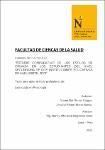| dc.contributor.advisor | Negreiros Mora, Nancy Alfonsina | |
| dc.contributor.author | Rimac Vargas, Noemi Rut | |
| dc.contributor.author | Urbina Novoa, Jessica Paola | |
| dc.date.accessioned | 2022-01-27T13:59:32Z | |
| dc.date.available | 2022-01-27T13:59:32Z | |
| dc.date.issued | 2021-11-28 | |
| dc.identifier.citation | Rimac, N. R., & Urbina, J. P. (2021). Estudio comparativo de los estilos de crianza en los estudiantes del nivel secundaria de dos instituciones educativas de Lima Norte, 2020 [Tesis de licenciatura, Universidad Privada del Norte]. Repositorio de la Universidad Privada del Norte. https://hdl.handle.net/11537/29166 | es_PE |
| dc.identifier.other | 158.24 RIMA 2021 | es_PE |
| dc.identifier.uri | https://hdl.handle.net/11537/29166 | |
| dc.description.abstract | En la presente investigación se determinó las diferencias en los estilos de crianza parental
en estudiantes de nivel secundario de dos Instituciones Educativas de Lima Norte, 2020. Se
realizó un estudio en 700 estudiantes de nivel secundaria de dos instituciones educativas de
Lima Norte, los cuales pertenecen a los grados de: 1er a 5to de secundaria. La metodología
es de enfoque cuantitativo con alcance descriptivo comparativo y diseño no experimental.
La técnica utilizada fue la encuesta y el instrumento aplicado fue la Escala de Estilos de
crianza de Merino y Arndt (2004), quienes estudiaron la validez de la Escala de Estilo de
Crianza de L. Steinberg, que consta de 22 ítems. Los resultados obtenidos de la investigación
mostraron que en la Institución Educativa número1, la mayoría de los estudiantes tienen un
estilo de crianza parental autoritario, esta representa el 48.4%; seguido de un 36.8% con
estilo autoritativo; contrario a estos valores, los otros estilos acumulan el 14.8% de
estudiantes. En cuanto la Institución Educativa número 2, la mayoría de los estudiantes
presentan un estilo de crianza parental autoritativo, esta representa el 76.3%; seguido el estilo
autoritario en un 20.7% de estudiantes. Los estilos permisivo, negligente y mixto acumulan
el 3.1% de estudiantes. | es_PE |
| dc.description.abstract | The present research determined the differences in parental parenting styles in high school
students of two educational institutions of North Lima, 2020. A study was carried out in 700
high school students from two educational institutions in North Lima, which belong to
grades 1 to 5 of high school. The methodology is a quantitative approach with comparative
scope and non-experimental design. The technique used was the survey and the instrument
applied was the Parenting Style Scale of Merino and Arndt (2004), who studied the validity
of L. Steinberg's Parenting Style Scale, which consists of 22 items. The results obtained from
the research showed that in Educational Institution number 1, most of the students have an
authoritarian parenting style, representing 48.4%; followed by 36.8% with an authoritative
style; contrary to these values, the other styles accumulate 14.8% of students. As for
Educational Institution number 2, most of the students present an authoritative parenting
style, representing 76.3%; followed by the authoritarian style in 20.7% of students. The
permissive, negligent and mixed styles accumulate 3.1% of students. | es_PE |
| dc.description.uri | Tesis | es_PE |
| dc.format | application/pdf | es_PE |
| dc.format | application/msword | es_PE |
| dc.language.iso | spa | es_PE |
| dc.publisher | Universidad Privada del Norte | es_PE |
| dc.rights | info:eu-repo/semantics/openAccess | es_PE |
| dc.rights.uri | https://creativecommons.org/licenses/by-nc-sa/4.0/ | * |
| dc.source | Universidad Privada del Norte | es_PE |
| dc.source | Repositorio Institucional - UPN | es_PE |
| dc.subject | Crianza | es_PE |
| dc.subject | Estudiantes | es_PE |
| dc.subject | Relaciones familiares | es_PE |
| dc.subject | Salud de los adolescentes | es_PE |
| dc.subject | Estilos de crianza | es_PE |
| dc.subject | Parenting styles | es_PE |
| dc.title | Estudio comparativo de los estilos de crianza en los estudiantes del nivel secundaria de dos instituciones educativas de Lima Norte, 2020 | es_PE |
| dc.type | info:eu-repo/semantics/bachelorThesis | es_PE |
| thesis.degree.grantor | Universidad Privada del Norte. Facultad de Ciencias de la Salud | es_PE |
| thesis.degree.level | Título Profesional | es_PE |
| thesis.degree.discipline | Psicología | es_PE |
| thesis.degree.name | Licenciado en Psicología | es_PE |
| dc.publisher.country | PE | es_PE |
| dc.subject.ocde | https://purl.org/pe-repo/ocde/ford#5.01.02 | es_PE |
| thesis.degree.program | Pregrado | es_PE |
| dc.description.sede | Los Olivos | es_PE |
| renati.advisor.dni | 18136825 | |
| renati.advisor.orcid | https://orcid.org/0000-0002-6432-1298 | es_PE |
| renati.author.dni | 77922610 | |
| renati.author.dni | 70255849 | |
| renati.discipline | 313016 | es_PE |
| renati.juror | Enciso Ríos, Johnny Erick | |
| renati.juror | Talledo Sánchez, Karim Elisa | |
| renati.juror | Lip Marín de Salazar, Tania Carmela | |
| renati.level | https://purl.org/pe-repo/renati/level#tituloProfesional | es_PE |
| renati.type | http://purl.org/pe-repo/renati/type#tesis | es_PE |





